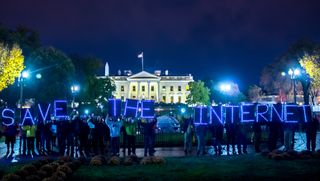FCC proposal is a huge win for net neutrality. What comes next?

Photo via Flickr user Joseph Gruber
On Wednesday, February 4, FCC chairman Tom Wheeler issued a statement about the FCC’s plans for regulating Internet service providers in the United States. Wheeler’s statement was the strongest official defense of net neutrality we’ve ever seen.
“I am proposing that the FCC use its Title II authority to implement and enforce open internet protections,” wrote Wheeler. “I am submitting to my colleagues the strongest open internet protections ever proposed by the FCC. These enforceable, bright-line rules will ban paid prioritization, and the blocking and throttling of lawful content and services. I propose to fully apply—for the first time ever—those bright-line rules to mobile broadband. My proposal assures the rights of internet users to go where they want, when they want, and the rights of innovators to introduce new products without asking anyone’s permission.”
Basically: wow. This statement comes several months after the FCC initially put forth plans for net neutrality that were met with public outrage, because they would allow for ISPs to create Internet fast-lanes for various content and services.We’ve already seen Netflix have to pay extra for its data to reach customers without being throttled.
I wrote about why net neutrality is important to PC gamers last year, and summarized all the bad news for net neutrality in 2014 in our PC gaming lows of the year. That public outrage I mentioned did make a difference, though. The FCC received more than four million public comments and enough emails to crash its servers.
The FCC reevaluated its much-criticized plans all winter, and finally made its official announcement this week. Wheeler’s proposal to regulate ISPs under Title II of the Communications Act of 1934 is exactly what we were hoping for last year; it means the FCC wants to regulate ISPs as “common carriers,” which allows them to enforce important rules. Rules that would prevent traffic shaping and fastlanes and ISPs giving their own services priority over competitors.
So...we won, right? The ISPs have to play nice, net neutrality is here to stay, and all that jazz?
PC Gamer Newsletter
Sign up to get the best content of the week, and great gaming deals, as picked by the editors.
Well, not quite. The FCC had made its proposal. Now it has to pass it. And that’s not going to be easy. Or simple.
Here’s the first thing you should know about Title II: It’s old. really old. Like, it’s-from-1934-and-we-didn’t-even-have-TV-back-then old. The Communications Act was updated in the 1990s, but it’s still full of rules that don’t pertain to the Internet. Naturally, ISPs argue that this makes common carrier laws unsuitable for regulating the Internet. Wheeler’s counter to that argument is in his statement:
“To preserve incentives for broadband operators to invest in their networks, my proposal will modernize Title II, tailoring it for the 21st century, in order to provide returns necessary to construct competitive networks. For example, there will be no rate regulation, no tariffs, no last-mile unbundling. Over the last 21 years, the wireless industry has invested almost $300 billion under similar rules, proving that modernized Title II regulation can encourage investment and competition.”
How the FCC modernizes Title II is hugely important to net neutrality and, right now, we have no idea how things will shake out. It’s a safe bet that Comcast, Verizon, AT&T, and other ISPs will be throwing millions of lobbying dollars against the FCC’s proposal. They’ll likely fight the FCC in court, and the FCC has lost to Verizon and Comcast in court before: that’s what got the Internet into this mess. When that happened in early 2014, though, the FCC was trying to apply common carrier regulations without actually classifying ISPs under Title II.
This is, quite probably, the beginning of a long, multi-year fight to enact strong government regulations tailored for the telecommunications realities of the 21st century. The end result will, hopefully, codify net neutrality as an integral part of the Internet as we know it. No matter how you use the Internet—to play games, stream films, Skype with your loved ones, read about the world—a freer, more open Internet will be a good thing.
If that’s not enough to get you pumped up...well, let John Oliver convince you.

Wes has been covering games and hardware for more than 10 years, first at tech sites like The Wirecutter and Tested before joining the PC Gamer team in 2014. Wes plays a little bit of everything, but he'll always jump at the chance to cover emulation and Japanese games.
When he's not obsessively optimizing and re-optimizing a tangle of conveyor belts in Satisfactory (it's really becoming a problem), he's probably playing a 20-year-old Final Fantasy or some opaque ASCII roguelike. With a focus on writing and editing features, he seeks out personal stories and in-depth histories from the corners of PC gaming and its niche communities. 50% pizza by volume (deep dish, to be specific).
Most Popular

